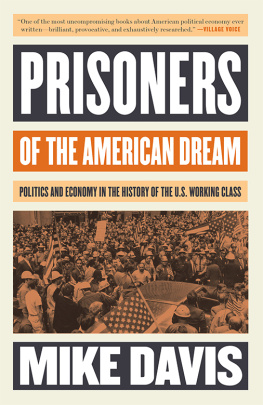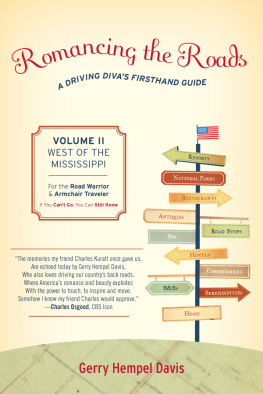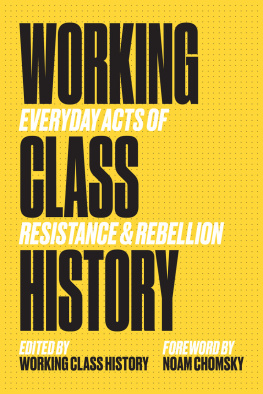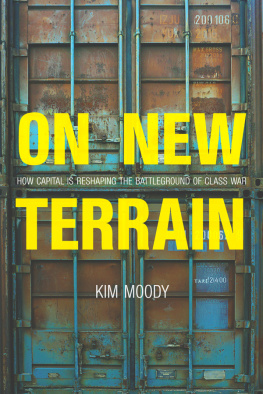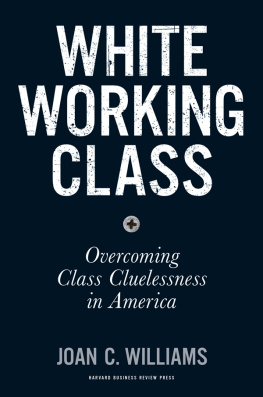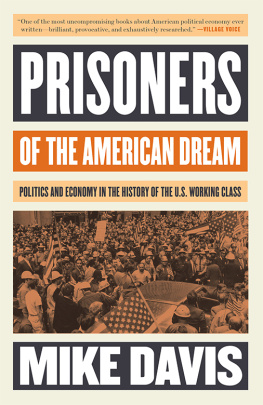Davis - Prisoners of the American dream: politics and economy in the history of the US working class
Here you can read online Davis - Prisoners of the American dream: politics and economy in the history of the US working class full text of the book (entire story) in english for free. Download pdf and epub, get meaning, cover and reviews about this ebook. City: USA, year: 2018, publisher: Verso Books, genre: Politics. Description of the work, (preface) as well as reviews are available. Best literature library LitArk.com created for fans of good reading and offers a wide selection of genres:
Romance novel
Science fiction
Adventure
Detective
Science
History
Home and family
Prose
Art
Politics
Computer
Non-fiction
Religion
Business
Children
Humor
Choose a favorite category and find really read worthwhile books. Enjoy immersion in the world of imagination, feel the emotions of the characters or learn something new for yourself, make an fascinating discovery.
Prisoners of the American dream: politics and economy in the history of the US working class: summary, description and annotation
We offer to read an annotation, description, summary or preface (depends on what the author of the book "Prisoners of the American dream: politics and economy in the history of the US working class" wrote himself). If you haven't found the necessary information about the book — write in the comments, we will try to find it.
Prisoners of the American dream: politics and economy in the history of the US working class — read online for free the complete book (whole text) full work
Below is the text of the book, divided by pages. System saving the place of the last page read, allows you to conveniently read the book "Prisoners of the American dream: politics and economy in the history of the US working class" online for free, without having to search again every time where you left off. Put a bookmark, and you can go to the page where you finished reading at any time.
Font size:
Interval:
Bookmark:

Praise for Prisoners of the American Dream
Impressivea perceptive and rigorous structural analysis
The Nation
One of the most uncompromising books about American
political economy ever writtenbrilliant, provocative, and
exhaustively researched
Village Voice
One of the most trenchant and original analyses of
American politics
Socialist Review
AMERICAN DREAM
History of the US Working Class

This paperback edition published by Verso 2018
First published by Verso 1986
Republished by Verso 1999
Mike Davis 1986, 1999, 2018
All rights reserved
The moral rights of the author have been asserted
1 3 5 7 9 10 8 6 4 2
Verso
UK: 6 Meard Street, London W1F 0EG
US: 20 Jay Street, Suite 1010, Brooklyn, NY 11201
versobooks.com
Verso is the imprint of New Left Books
ISBN-13: 978-1-78663-590-7
ISBN-13: 978-1-78663-591-4 (UK EBK)
ISBN-13: 978-1-78663-592-1 (US EBK)
British Library Cataloguing in Publication Data
A catalogue record for this book is available from the British Library
Library of Congress Cataloging-in-Publication Data
A catalog record for this book is available from the Library of Congress
Typeset in Garamond by MJ&N Gavan, Truro, Cornwall
Printed and bound by CPI Group (UK) Ltd, Croydon, CR0 4YY
This book is dedicated,
in the memory of Magdalea Mora,
to the combatants of the FMLN
These essays appear at a paradoxical moment in US history, on the centenary of the first May Day and fifty years after the great CIO sitdown strikes. Until very recently, these anniversaries would have invited Panglossian reflections on the success of a peaceable institutionalization of the class struggle in the United States. After all, according to most textbook accounts, the Haymarket martyrs and the Flint strikers were, whatever their own visions of their activity, inadvertent heroes in the rise of a pluralist industrial order based on collective bargaining. For all of its early drama and violence, the trade-union movementlike the later Black liberation strugglewas supposedly settled into a placid tributary of liberal progress.
Such a view, however persistent in textbooks, is no longer tenable in reality. On every side, supposedly irreversible achievements of the New Deal or Great Society are, in fact, undergoing reversal. As organized labor enters its second century, it faces not the security of a mature industrial relations system, but a decline of its membership and the threat of deunionization. Likewise, the civil rights organizations, their forward momentum already checked in the early 1970s, fight losing rearguard battles against the Reagan administrations aggressive campaign to roll back affirmative action and other moderate reforms.
This accelerating rightward realignment of economic and political power demands a reconsideration of the main currents of modern American history. The smug liberal teleology of US history, with its happy endings in a perpetually self-reforming society of affluence, scarcely accords with the new politics of inequality and social revanchism that have become dominant since the late 1970s. Equally out of date, I shall argue, are the two main radical correlates of this teleology, the contrasting theories of a hegemonic corporate liberalism oralternativelya surrogate socialist Democratic Party.
For what is most striking about the United States in the 1980s is not the one-dimensionality of consciousness (per popular Marcusean analyses of the 1960s) but the increasing one-sidedness of the class struggle. Nowhere in the advanced capitalist bloc, with the partial exception of Japan, has trade-union power collapsed so precipitously or under such brutal pressure. Nowhere, not even in Thatchers Britain, has the New Right succeeded in mobilizing such a broad spectrum of propertied strata or effecting such a sweeping redistribution of national income to the benefit of the collective middle class. And nowhere has capital enjoyed such unfettered freedom to experiment with new accumulation strategies or to shift investment between sectors and regions regardless of social cost. The result has been the emergence of a new social and cultural landscape of intensifying class and racial polarizations: a late imperial order that has diverted the modest streams of reform to feed the insatiable appetites of a bloated have coalition and to extend the arms race into outer space.
To the extent that the rise of this post-reformist complex of interestswhich virtually ensures Reaganism an afterlife, even in the advent of a Democratic successionconfounds liberal and populist historiographies, it also poses old questions with a new urgency. The first of these questionsaddressed in Part One belowconcerns the fate of the working class in the most powerful capitalist society. Why has American labor, for all of its cultural and organizational assets, been so weak as a class force? The problem here is not only the classical question of why is there no socialism in America?, but, more broadly, of why labor in America has been so relatively unsuccessful in the political representation of its short or long-term interests? The first two chapters reconsider, in some detail, the conjunctural intersections between trade-union militancy and the political system, proposing elements of an explanation for the failure of independent labor politics as well as for the persistent inability of labor-liberal forces to capture the Democratic Party. Further aspects of organized labors unhappy marriage with the Democrats are taken up in later chapters as well, particularly the AFLCIOs impotence to prevent a displacement of New Deal reformism by a fundamentally conservative neoliberalism. Chapter Three, meanwhile, reexamines the illusory social contract at the point of production and traces the origins of the current management offensive that is threatening unionism across the breadth of the private sector.
The converse of labors historical weakness, of course, is the unique balance of powerunder democratic conditionsthat has favored all the bourgeois classes in American society. In the first chapter, I argue that the ballast of capitals hegemony in American history has been the repeated, autonomous mobilizations of the mass middle strata in defense of petty accumulation and entrepreneurial opportunity. In the second half of the bookwhich surveys the political and economic terrain of ReaganismI attempt to show that it was precisely these forces, not labor or the welfare state, that constituted the principal constraint on the direction of economic restructuring in the 1970s. The result, which I sketch out in , is a logic of overconsumptionism that attempts to sustain booming middle-class affluence and corporate profitability through new levels of exploitation of the working poor as well as, increasingly, the traditional industrial working class.
The key to the temporary success of this strategy has been the recharged role of the federal government in ensuring the expanded reproduction of middle-strata claims to the national income. As I argue in Part Two, Democratic neoliberalism as well as Reaganism asserts that the first function of the state is to provide welfare to the well-to-do and preserve a dynamic frontier of entrepreneurial, professional and rentier opportunity. The necessary cost of such a politicsespecially given the growing reorientation of the economy from mass demand to an enlarged upscale markethas been the abandonment of the reformist politics pioneered by the New Deal. Indeed, I try to show that the historic realignment that is occurring
Font size:
Interval:
Bookmark:
Similar books «Prisoners of the American dream: politics and economy in the history of the US working class»
Look at similar books to Prisoners of the American dream: politics and economy in the history of the US working class. We have selected literature similar in name and meaning in the hope of providing readers with more options to find new, interesting, not yet read works.
Discussion, reviews of the book Prisoners of the American dream: politics and economy in the history of the US working class and just readers' own opinions. Leave your comments, write what you think about the work, its meaning or the main characters. Specify what exactly you liked and what you didn't like, and why you think so.

